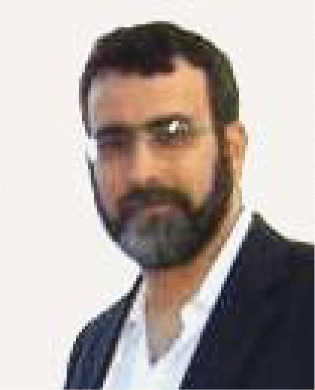- ON THE DECADE
- THE DECADE'S CAMPAIGN
- REPORTING ON PROGRESS
- THE DECADE'S PROGRAMMES
- FOCUS AREAS
-
- Access to sanitation
- Financing water
- Gender and water
- Human right to water
- Integrated Water Resources Management
- Transboundary waters
- Water and cities
- Water and energy
- Water and food security
- Water and sustainable development
- Water and the green economy
- Water cooperation
- Water quality
- Water scarcity
- FOCUS REGIONS
- RESOURCES FOR
- UN e-RESOURCES
International UN-Water Conference. Water in the Green Economy in Practice: Towards Rio+20. 3-5 October 2011
The Green Economy and... Carlos Carrión-Crespo
 "We have to stop thinking about human resources and start thinking about resourceful humans."
"We have to stop thinking about human resources and start thinking about resourceful humans."
Carlos Carrión-Crespo
Senior Specialist in Public Services at the International Labour Organization (ILO)
What does 'water in the green economy' mean to the ILO?
Water in the green economy for us means promoting green sustainable water projects. These projects can promote decent work, which is our main agenda. How do we achieve that? By encouraging participation of workers in the transition to a green economy; by encouraging that water projects take into account the needs of indigenous people, women and children. Encouraging the sustainability of water projects reduces the weight on water supply on women and child labor, because it allows them to dedicate less time to water supply duties. Labor issues are essential in the green economy. Realizing the transition to the green economy involves meaningful participation by workers and employers. They are the most important actors in this transition. The question is; are they prepared for this? With the ILO we aim to prepare workers and employers and help them to be involved.
Which change is essential in the transition to a green economy?
We should create a social dialogue. For the ILO, social dialogue includes all types of negotiation, consultation and exchange of information between, or among, representatives of governments, employers and workers on issues of common interest. This enables the inclusion of all actors in the transition to the green economy. We should involve the people on the ground, the workers, basically everyone, in the water supply reforms. Many times we find that companies are kept out of the loop and the governments just try to reform the sector on their own. However, it is really important to include the needs of workers when changes are made. To increase productivity, you need to have lower employee turnover, skilled employees and ownership of everybody involved in the industry. For us this is more important than technological change.
What are the most persistent barriers for the green economy and how can we overcome them?
The loss of water is a huge problem. There is a lack of mechanisms or incentives to save water. To overcome this, we need to increase the knowledge of all actors. There are a lot of local enterprises that don't have the know-how. Therefore, we need to create skills development programs for workers and also for enterprises. Furthermore, we need to generate political will. In conference after conference we hear that the political will is lacking. However, this will is essential if we really want to make a change towards the green economy.
A good concrete example of a skill development program is our project in Panama. There we have a program that involves indigenous groups in water management. They are empowered to be partners, rather than beneficiaries. So the users are really integrated into the water supply chain. It is in the community's own interest to manage the water well. Implementing community participation and sanitation and hygiene education resulted in a more efficient water use in the community.
What are green jobs actually?
When we are talking about green jobs, we are talking about jobs that contribute to saving water, to reducing the loss of water, to avoiding deforestation and environmental degradation in general. These jobs contribute to overcoming the barriers to lack of savings of water, of lack of knowledge and skills on the part of the actors. Green jobs contribute for example to overcoming the barriers to water savings that exist very often, due to lack of knowledge and skills from actors involved. When creating green jobs, the ILO focuses on the necessary skills and knowledge.
Green jobs are not only jobs that are contributing to greening the economy, but also jobs that contribute to sustainability by including disadvantaged groups in the water supply chain, through participation. Here we are not just talking about the workers of the enterprises, but also about the users. The users represent a very large labor pool. Many community members are providing invisible labor. Women carrying water over 10-20 kilometers are working, but nobody recognizes that work.
How can we create more green jobs?
Definitely by training and awareness-raising. This is something that dollar for dollar is the most efficient investment. We have to stop thinking about human resources and start thinking about resource for humans. Providing resources to people has a high multiplier effect in creating more green jobs. That is one of the things ILO is working on. We are also working in utilities around the world to integrate the whole utility community into the reform processes. In many places we see that the reform processes are stuck, because there is a lot of opposition. Governments are not generating the political will necessary for sustainable reforms. By integrating employers and workers we create more of a momentum, we create more ownership.
In creating green jobs, we should focus on capacity development and knowledge sharing across countries and continents. I think the Zaragoza conference can be a good opportunity to share the lessons learned from around the world.
What is your message for the Rio+20 conference in 2012?
When we are talking about the green economy, we need to see that water is part of a larger system. When we promote greening of water supplies we are not only achieving water saving but also avoid deforestation, realize a full economic circle, food security and even reduce wars. Water is the future source of conflict. We really have to take into account a full system approach in which we consider all aspects of the economy.
For ILO, greening the economy is not only about saving water, but also about participation of all economic sectors in the management of water and other natural resources. Here, communication is essential. Communication leads to social dialogue and promotes a more productive environment, more productive enterprises and sustains the effort of greening the economy. We need to have motivated work forces and motivated enterprises in the water sector. We need to integrate the workers and small enterprises in the transition and not leave it to the bigger actors. My main message is realizing an inclusive green economy.
What are your expectations on the conference in Zaragoza and what would you like to learn?
We would like to integrate the labor issues in the wider discussions on sustainability. It is my experience that a lot of the discussions that were held in the past mostly concentrated on technology development. I have heard a lot of people say: "we know what it takes; we know what we need to do; we just have to do it". My question is: do we really know what it takes? Are we doing what it takes? I think inclusiveness and participative governance of water reforms are absolutely essential elements in engineering and reengineering the water sector. This is even more important than the technological change. The technological focus and participative focus can coexist, but participation should be emphasized more.
>> Conference Home
>> Statements from UN Agencies
>> Video recording of sessions

>> Ch1 Water on the Road to Rio+20
>> Ch2 Challenges and opportunities for water in the transition to a GE
>> Ch3 Thematic conference papers
>> Ch4 Conference summary: Water in the GE in practice
>> Ch5 The way forward
>> A1 Water toolbox: A contribution to Rio+20
>> A2 Feedback report
>> A3 Communications report
>> Case papers by tool
>> By region 
>> Developing countries 
>> Developed countries 
>> Agenda 
>> Economic instruments
>> Green jobs
>> Sustainable financing
>> Investments for biodiversity protection
>> Water technology
>> Water planning
>> ESCWA region
>> LAC region
>> Conference daily
>> Interviews with case presenters 
>> Presentations
>> Communications articles
>> Conference media brief 
>> Daily press notes
>> Interviews with session conveners
>> Issues information briefs
>> Tools information briefs
>> Banners
>> Reader on water and the Green Economy 
>> Conference poster 
 >> Discussion forum
>> Discussion forum
 >> Twitter
>> Twitter
>> Water, energy and food security
>> Spanish Business Dialogue
>> Stakeholder dialogue on the Green Economy in Spain
>> Technical visit
>> Organizers
>> Participants
>> Conference committee
>> Rationale
>> Tools
>> Expected outcomes
>> 2nd UNCSD PrepCom
>> Road map to Rio+20
>> Key questions on GE
Copyright | Terms of use | Privacy notice | Site Index | Fraud alert | Help





